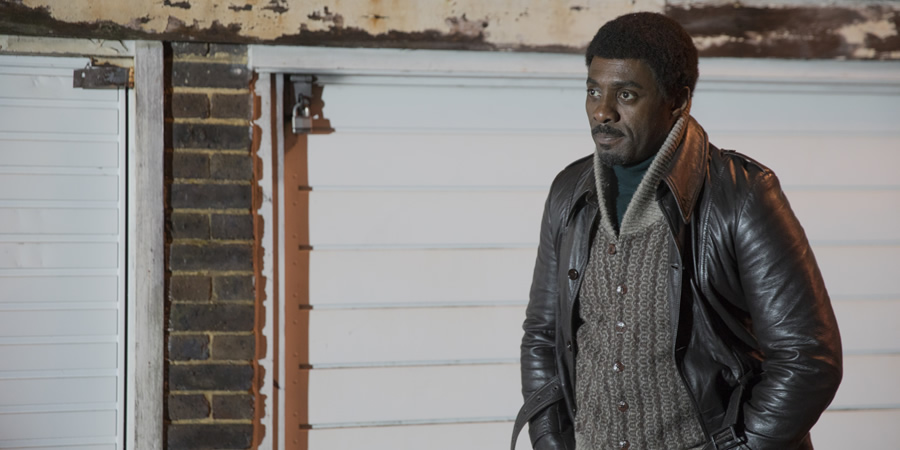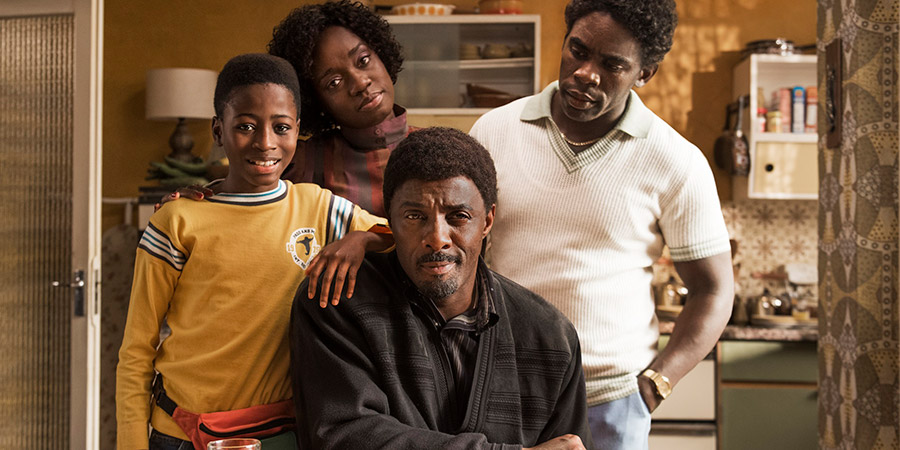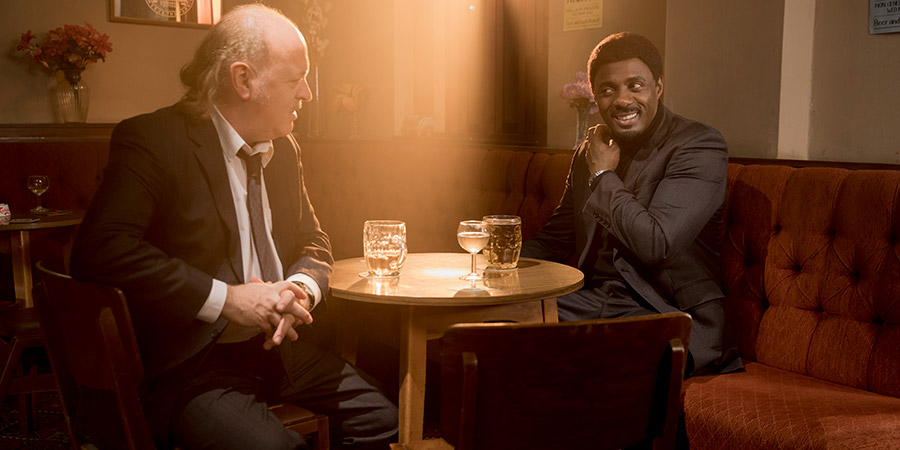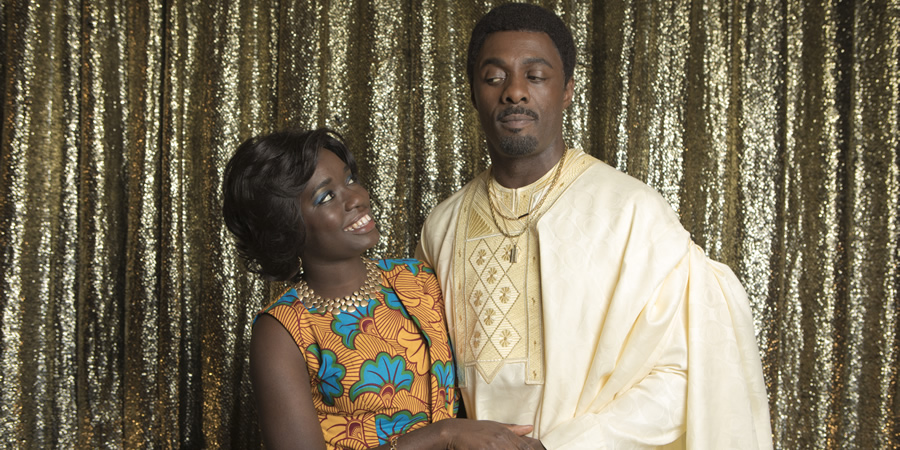Idris Elba interview

Idris Elba talks about making his first sitcom...
How did In The Long Run come about?
It came from a 20-minute short that I did for Sky called King For A Term. And then the opportunity came to extend it and maybe tell some longer stories about the 80s - we discovered we loved looking at that period and that it might work as a comedy. Plus there were areas in my life that were interesting to me, that I thought could sustain a bit of a situation comedy.
Set the scene. What is In The Long Run about?
It follows two families that live in the same block of flats: their sons play together, and it's about what it's like to live in a community, where 'in the long run' we're all the same. There's no trickery, you like these people or you don't. And it's nice to have a multicultural cast, it's nice to see an African family on screen alongside an English family. And my character, Walter, his younger brother Valentine comes over from Sierra Leone. He's a bit of a ladies' man, a bit of a chancer, a bit of a jack of all trades. The story is about him coming here, and how the characters adapt.
To what extent is it based on your childhood?
It's a bit of a mish-mash, to be honest: it really is just a good look at the 80s, which was when I was turning from boy to teenager. It's looking at what London was like then, especially east London, where I came from.
Was it always going to be a comedy, because you could easily look back at that time and say there was a darker side to it?
I think it has drama, too, to be honest: as the title suggests it's really just a slice of life, and why we're all the same, to some degree.

Tell us more about who are you playing...
I play Walter Easmon, who is based on my dad. He's an immigrant who comes from Sierra Leone with his wife and sets up shop in London. He's not particularly a comedic character, but my dad was the sort of life-of-the-party type of guy. Walter works as a shop steward in a car factory, as my dad did.
What's Walter's connection to Bagpipes?
Bill Bailey's character Bagpipes is a guy that works with Walter in the factory, and he lives upstairs from where the Easmons live. They're friends, they're neighbours, they work together and their children play with each other.
What's it been like for you to play a character based on your own father?
It's been all right, but it's a bit sad: my old man passed a few years ago, so it's bittersweet in places. But this character's taken on a life of its own, you know. I'm not really doing an impression of my old man.
Is it strange revisiting your youth in the forms of the sets and the costumes?
Well, I think the art direction, actually, is the most compelling thing. Because they've obviously taken notes from the show we did before and stuff that I've said in the press, and they've really made a museum. There are so many artefacts that my parents had at the time that have shown up on the set - those are the moments when I really go, "That's so crazy!" Like there's a big fish on the mantelpiece - my mum and dad actually had one of those! And the pictures in the frames all look like pictures that I grew up around and was looking at.
Is Kobna, Walter's son, meant to be you?
Yeah, he's meant to me as a kid. And it's really weird sometimes looking up, seeing parts of my life being displayed - it's fun too. Remember though that this isn't exactly a carbon copy of my life, this is its own thing.

What's been your role as producer on In The Long Run?
As a producer of television, which I have done for a little bit now, this is a really interesting show to make, because I've never done comedy, never produced comedy. It's not up to me to be the fact checker, because it isn't all based on my life, it's more about just making sure that we make a truthful snapshot of the 80s, which I do hold close to me. And actually it's just nice to see something go from an idea into fruition and then end up on the TV - that's a great accomplishment.
What is it about the 80s that fascinates you?
I think the 80s was like a bit of an English growth spurt, in terms of culture, in terms of legislation, parliament, you know - lots of really big changes happened back then. And essentially some of our identity now comes from that time. It was a very colourful era: we went from quite conservative clothing to quite outlandish clothing, and from being tight-lipped to quite outspoken. It was the birthplace of some of the greatest artists in the English pop music scene. And one of the things we tried to examine in the script is that people were a lot more carefree, rightly or wrongly, about what was said. We weren't as sensitive about other people's feelings, and that created a society that stood up and fought against things it didn't want, because people weren't sensitive about saying, "That's wrong", and, "That's right". And it made neighbours love or hate each other, which is what we're exploring.
You say this is your first comedy: are you enjoying making people laugh?
I love it! I'd never done it before and it's very different from drama - the scheduling is very gruelling. But I love working with Bill Bailey, who is a natural comedian, he doesn't overdo it. And when I do a lot of drama, it tends to be quite heavy, so this is nice.
Tell us about some of the other cast you've been working with?
Sammy [Kamara] is a really good actor, young, lots of energy, also Sierra Leonean, a similar upbringing to me, though obviously a different time period. It's great to watch him turn 'me' into reality, although it was a bit weird. But the other actors are brilliant too - Maddie [Appiah], who plays Walter's wife Agnes, is fantastic, and she reminds me of my mum back then. And Jimmy Akingbola [Valentine] is amazing. He's got quite a big character to play and he just attacks it in the right way.

Your mum visited the set. What has she made of the show?
My mum was in the original pilot playing the lollypop lady, but this is the first time she's been on set. She seems quite underwhelmed, if I'm honest! I don't know why, but she's not really excitable like that.
Does the series look at the tough side of living on an east London estate in 1985?
Yeah. It does look at Walter's younger son Kobna being bullied, and it puts a lens on racism and what it was like in the 80s. In truth, it was a lot more in your face than how we show it, if anything. We don't ignore it, but we don't make it the focus. We wanted to show what bound people together, not what divided them.
When you think back to growing up in the 80s, what are your strongest memories?
A lot of growth for me happened when I was between 10 and 15. I look back at that time fondly. It's when I learned I was capable of doing quite a few things. I learned that if I picked up an instrument I could play it, that if I ran fast I could win a race, if I played football... you know, I just learned that I was capable of stuff, and sort of lucky in that sense. That's when I realised: I'm as good as the next man, if I really apply myself.
You're a major league Hollywood star. Why make a TV comedy?
I don't think about the why, because I think that's for others to think about. But from my perspective, I get to create a piece of art that sits in the guise of what art should be, which is take it or leave it, however it comes. Never in my career have I categorised myself, if it's theatre or films, I'm just an actor. But the opportunity to now produce something, to be the author of it, to really push that out there, that's different for me. I might have movies coming out, but I'm not really the producer of them. This one is starting from grass roots, and I love that!

